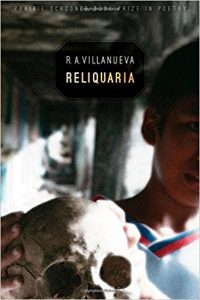Reliquaria
 Reading this collection makes one aware that being human is also a religious experience. The clash of languages throughout this collection opens doors to foreign rooms full of incense which are, in truth, situated in our own backyards. Villanueva conjures the heat of a thousand candles that envelope; billows of what seem to be unknown transcendent meanings have the capacity to form bodies and bones on further reading, and the shards that make up everyday life merge into the shape of the sacred. The resulting outlines do not transmogrify into this or that Saint, nor this or that practice or ritual – and yet the Sacred appears before your eyes, aiding our own transformation in the reliquary of Villanueva’s words. Consider:
Reading this collection makes one aware that being human is also a religious experience. The clash of languages throughout this collection opens doors to foreign rooms full of incense which are, in truth, situated in our own backyards. Villanueva conjures the heat of a thousand candles that envelope; billows of what seem to be unknown transcendent meanings have the capacity to form bodies and bones on further reading, and the shards that make up everyday life merge into the shape of the sacred. The resulting outlines do not transmogrify into this or that Saint, nor this or that practice or ritual – and yet the Sacred appears before your eyes, aiding our own transformation in the reliquary of Villanueva’s words. Consider:
When I think aloud,
Nothing we do living
can be as beautiful
as what the living will do
with our bones, you reply
(“Sacrum”)
Reliquaria was awarded the 2013 Prairie Schooner Book Prize in Poetry, and it is a multi-cultural gem by the Filipino American R.A. Villanueva. But this is a Poet whose reach spreads far beyond the United States. The international appreciation his poetry garners is evident in his participation in poetry festivals all over the world including the StAnza International Poetry Festival, St. Andrews, Scotland, the 2016 Dodge Poetry Festival in Newark, the 2015 Open Book Festival – Cape Town, South Africa. He has been recognised by organisations like the Forward Arts Foundation, Kundiman, the Geraldine R. Dodge Foundation and The Asian American Literary Review and many more. Both his Poetry and prose have been widely published in outlets like Virginia Quarterly Review, Bellevue Literary Review, The Collagist, The Literary Review and many more. A full list of his publications and accomplishments – and some interesting interviews – can be found on Villanueva’s homepage.
Villanueva’s work opens a pathway which is usually overgrown to the point of being often too jungly for western minds. This collection enables the reader to walk on this path in a way without tripping up, and which doesn’t bring to mind the shame, the wars, the witch burnings or the hypocrisy punctuating religious history. Instead the reader is reminded of something almost lost to modern life: the joy of touching the divine, the beauty of the everyday sacred, its soothing properties, but also its physical presence in our bones, our breath, and in our bodily being.
With a Gottfried Benn-like anatomical precision Villanueva dissects the flesh, both bodily and on the page. But in contrast to the military surgeon Benn, who worked on the battlefields during the First World War, Villanueva’s linguistic scalpel does not stop at the tendons and bones of the dead; he cuts further, deeper to the physical divinity of our bones.
In an Interview with Kaveh Akbar, Villanueva gave voice to the motivations behind his poetry: “Poetry is trying, it seems to me, to conceive of how our universe works”. In order to understand these workings Villanueva uses his own encyclopaedic knowledge in writing and thinking that underscores and gives flesh to a cornucopia of religious attitudes spanning the innocent, the sacred, the holy and the ephemeral.
Making it through unaltered is the point
In matters of remorse. Be calm. Soon
we will bear sentimentality, scent
what is lost in these cells with carrion,
asphodel, turpentine, forsythia
blooming somewhere in the dark. Scientists
warn & call this consequence: black huia
perished but for museum specimens,
the great auks beaten, dashed, the auger birds
coated with fallout. Everything will go
to wrack, they say. The thriving, delighted,
and everything keeping Him close to you.
Scored for human voices, a body is
the morning before opening my eyes.(“On Transfiguration“)
Villanueva’s poetry is about the struggle to be a whole person in a universe which is sacred. It is also about becoming and remaining human in a universe of divine flesh and sacred bones.

Leave a Reply